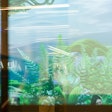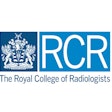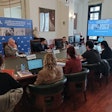
The Royal College of Radiologists (RCR) is set to roll out a support and well-being initiative to its members and fellows -- which include 8,500 radiologists -- in a bid to reduce pressure in the workplace that may result in bullying. The strategy will pivot on tools tailored to specific needs, to be created by the RCR.
The move follows an internal meeting in May between members of a working group to discuss factors that can lead to problems with stress and burnout.
The aim is to devise a cross-faculty, three-pronged strategy to combat stress drivers, according to Dr. Caroline Rubin, vice president of clinical radiology at the RCR. She noted that some of the contributing factors were likely to differ depending on career stage and specialty, such as clinical radiology or clinical oncology.
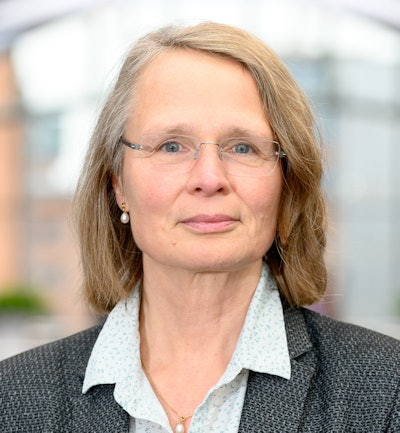 Dr. Caroline Rubin, vice president of clinical radiology at the RCR. Image courtesy of the RCR.
Dr. Caroline Rubin, vice president of clinical radiology at the RCR. Image courtesy of the RCR."We hope that RCR can bring something new to the table, through personalizing guidance and resources to support the workforce," she said. "We hope to create a strategy in line with similar moves by the British Medical Association and General Medical Council based on prevention, spotting the early signs, and working cultures. If we tackle stress and burnout, then logically bullying will be reduced."
The assembled working group is meeting again in October to consider the known factors that lead to stress and burnout and make recommendations for potential tools and mechanisms of support. An initial report and well-being strategy will also be published early next year.
"We will review what members and fellows need based on the working group's recommendations before deciding exactly what resources the RCR can provide," Rubin said. "Potential solutions include a toolkit, an inquiries line, and easily accessible online support."
To date, discussion around stress drivers has provided an overview of how burnout may arise. There is a correlation between these drivers and outcome, according to Rubin. For example, the amount of reporting radiologists are expected to undertake can lead to reckless reporting, errors, and stress, while in oncology the need to deliver "bad news" daily is another stress generator. Here, safe forums such as Schwartz Rounds for sharing stories and getting emotional support may be useful.
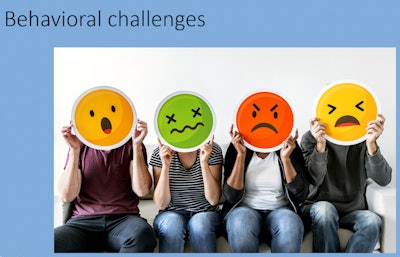 With stress, bullying, and patient safety in mind, healthcare staff can access a range of resources, such as those from the Clinical Human Factors Group charity in the U.K., according to Dr. Pat Set, who spoke at the recent RCR annual meeting. Images courtesy of Dr. Pat Set.
With stress, bullying, and patient safety in mind, healthcare staff can access a range of resources, such as those from the Clinical Human Factors Group charity in the U.K., according to Dr. Pat Set, who spoke at the recent RCR annual meeting. Images courtesy of Dr. Pat Set.The RCR also intends to investigate typical stages of career stress and how the organization can better support its members at these known intervals, which include exam time for trainees, the transition period from trainee to consultant, and on-call stress for older consultants nearing the end of their time in practice.
Rubin pointed to the need for well-being and support structures in hospitals and for the remote radiologist who is isolated from a team environment.
However, as she explained, it is difficult for anyone to stay stress-free given the current workload and working hours.
Limited funds
"There is an exponential increase in funding needed to deliver the service," she said. "Patients need to be seen and images reported, and there can't be that many radiologists who are not affected by the pressure of an overburdened system."
But there is no magic money tree. The National Health Service (NHS) will have to think strategically to find solutions, whether these involve the equivalent of physician associates (staff with specific medical training to help support doctors); credentialed training for breast clinicians; radiographer-delivered reporting, such as the existing four-tier structure for breast imaging; and advanced clinical practitioners.
Whatever the direction taken, these changes to practice will also be disruptive initially, so stress-busting strategies have never been more important, she said.
Meanwhile, at the recent annual RCR meeting (14 to 16 October), the topics of stress and bullying were covered in the session "Developing educators in radiology and oncology." RCR Human Factors Adviser Dr. Pat Set, from Cambridge University Hospitals NHS Foundation Trust, revealed how to implement a human factors program. Her colleague, radiologist Dr. Saqib Butt, also from Cambridge, provided an assessment of the present work culture: "Bullying and harassment survey in radiology -- a local survey from East of England." In addition, Civility Saves Lives' campaigner Dr. Chris Turner, an emergency medicine consultant at Coventry and Warwickshire NHS Trust, presented "Civility and radiology -- better for us, better for the patients."
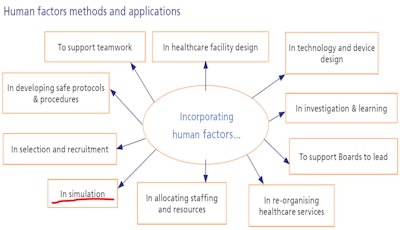 Incorporating human factors in the clinical setting leads to a less stressful and safer working environment, according to Dr. Pat Set.
Incorporating human factors in the clinical setting leads to a less stressful and safer working environment, according to Dr. Pat Set.Speaking with AuntMinnieEurope.com, Dr. Paul McCoubrie, a consultant radiologist at North Bristol NHS Trust and former human factors adviser for the RCR, underlined that radiology has broadly similar reported rates of bullying compared with other NHS departments.
Bullying and harassment in healthcare affect patient outcomes, according to McCoubrie, who conducted a national survey in 2018. But apart from putting out zero-tolerance statements, what should be done about those accused of bullying, who are often struggling in the workplace themselves?
"The accused claim mitigating circumstances, or they make counteraccusations. They say they were being bullied themselves, or that they were trying to do the right thing and protect patients. Rarely is it obviously one-sided and unarguable," he noted, echoing Rubin in the belief that stress and overwork play a large role in what leads to the problem.
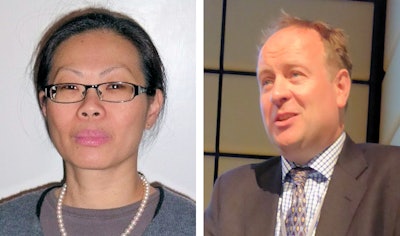 Left: Dr. Pat Set, human factors adviser at the RCR (image courtesy of Set). Right: Dr. Paul McCoubrie, consultant radiologist at North Bristol NHS Trust.
Left: Dr. Pat Set, human factors adviser at the RCR (image courtesy of Set). Right: Dr. Paul McCoubrie, consultant radiologist at North Bristol NHS Trust.He pointed to the Royal College of Surgeons of Edinburgh taking an enlightened approach by publishing online resources aimed at supporting surgeons and highlighting problem behavior and its causes.
He also praised the Civility Saves Lives campaign, which is using evidence to show that rudeness can lead to poor healthcare delivery across the NHS.
"The RCR and wider community has recognized that there is a problem, and radiologists are now working on getting their house in order," he noted.











